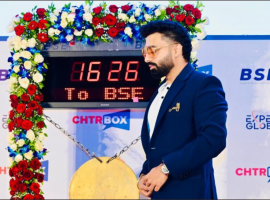Meanwhile, standing alongside Bansal, the co-founder of BlueStone, Gaurav Singh Kushwaha, shared his thoughts and emphasized the importance of the omnichannel strategy for their direct-to-consumer (D2C) operations.
“We initially reached a revenue of INR 50-60 Cr solely through online operations. However, we soon realized that while people were exploring new jewelry online, the conversion rate lacked due to a trust deficit. The ease of purchase hadn’t developed as much as confidence in the browsing process. Hence, a blend of offline and online channels has proven incredibly effective for us,” he explained.
The three-day event began on Monday, March 18 and will wrap up on Wednesday, March 20. The opening ceremony was graced by esteemed guests including DPIIT secretary Rajesh Kumar Singh and former NITI Aayog CEO Amitabh Kant. The event featured over 10 thematic pavilions where startups presented their innovative products. Other notable attendees included Deepinder Goyal from Zomato, Rikant Pittie from EaseMyTrip, Falguni Nayar from Nykaa, Peyush Bansal from Lenskart, and Rajan Anandan from Peak XV Partners.
Peyush Bansal, CEO of Lenskart, expresses skepticism towards the omnichannel business model, advocating understanding market pain points and addressing genuine problems over rigid adherence to specific business channels. He highlights Lenskart’s successful expansion from an online-only to a thriving offline presence, with over 2,000 stores in India and plans to launch 300-400 stores abroad. Despite disclosing an operating revenue of INR 1,618.3 Cr leveraging its omnichannel strategy, Bansal remains uncertain whether this approach will ensure sustained success due to the ever-evolving nature of consumer channels. Gaurav Singh Kushwaha, co-founder of BlueStone, contrasts this view, emphasizing the omnichannel strategy’s efficacy for their direct-to-consumer operations.




